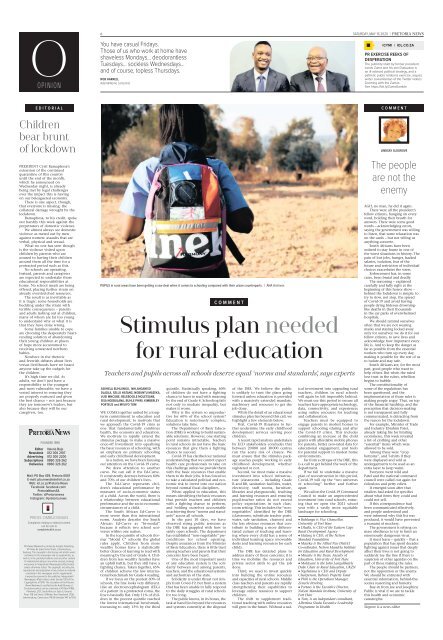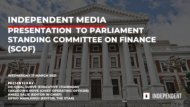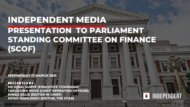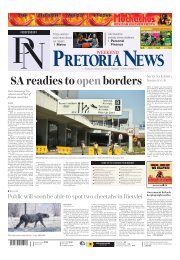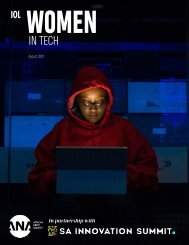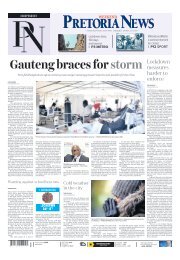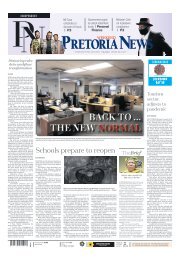PW_MAIN_E1_160520_ALL-1
You also want an ePaper? Increase the reach of your titles
YUMPU automatically turns print PDFs into web optimized ePapers that Google loves.
OOPINION<br />
6<br />
You have casual Fridays.<br />
Those of us who work at home have<br />
shaveless Mondays… deodorantless<br />
Tuesdays… sockless Wednesdays…<br />
and of course, topless Thursdays.<br />
ROB HARRELL<br />
Adam@Home cartoonist<br />
SATURDAY, MAY 16 2020 | PRETORIA NEWS<br />
ICYMI | IOL.CO.ZA<br />
PR EXERCISE REEKS OF<br />
DESPERATION<br />
The publicity stunt by former president<br />
Jacob Zuma and his son Duduzane is<br />
an ill-advised political strategy, and a<br />
pathetic public relations exercise, argues<br />
writer Jovial Rantao of the Twitter videos<br />
Zooming with the Zumas.<br />
See https://bit.ly/ZumaGamble<br />
EDITORIAL<br />
COMMENT<br />
Children<br />
bear brunt<br />
of lockdown<br />
PRESIDENT Cyril Ramaphosa’s<br />
extension of the continued<br />
quarantine of this country<br />
until the end of the month,<br />
which he announced on<br />
Wednesday night, is already<br />
being met by legal challenges<br />
over the impact this is having<br />
on our beleaguered economy.<br />
There is one aspect, though,<br />
that everyone is missing; the<br />
collateral damage wrought by the<br />
lockdown.<br />
Ramaphosa, to his credit, spoke<br />
out harshly this week against the<br />
perpetrators of domestic violence.<br />
We almost always see domestic<br />
violence as meted out by men<br />
against women: assaults that are<br />
verbal, physical and sexual.<br />
What no one has seen though<br />
is the violence visited upon<br />
children by parents who are<br />
unused to having their children<br />
around them all the time for a<br />
protracted period such as this.<br />
No schools are operating.<br />
Instead, parents and caregivers<br />
are expected to undertake those<br />
educational responsibilities at<br />
home. No school meals are being<br />
offered, placing further strain on<br />
already overstretched resources.<br />
The result is as inevitable as<br />
it is tragic: some households are<br />
buckling under the strain with<br />
terrible consequences – parents<br />
and adults lashing out at children,<br />
many of whom are far too young<br />
to understand why or what it is<br />
that they have done wrong.<br />
Some families unable to cope<br />
are choosing the desperately heartrending<br />
solution of abandoning<br />
their young children at places<br />
of hope more accustomed to<br />
receiving unwanted newborn<br />
babies.<br />
Nowhere in the rhetoric<br />
and feverish debates about lives<br />
versus livelihoods have we heard<br />
anyone take up the cudgels for<br />
the children.<br />
It’s high time we did. As<br />
adults, we don’t just have a<br />
responsibility to the youngest<br />
and most vulnerable; we have a<br />
vested interest in ensuring they<br />
are properly nurtured and given<br />
the best chance – not just because<br />
they are tomorrow’s leaders, but<br />
also because they will be our<br />
caregivers, too.<br />
Editor<br />
Newsdesk<br />
Advertising<br />
Subscriptions<br />
Deliveries<br />
FOUNDED 1898<br />
Valerie Boje<br />
012 300 2107<br />
012 300 2200<br />
0860 326 262<br />
0860 326 262<br />
Mail: PO Box 439, Pretoria 0001<br />
E-mail: pta.newsdesk@inl.co.za<br />
Web: iol.co.za/Pretoria News<br />
Facebook: facebook.com/<br />
PretoriaNewsSA<br />
Twitter: @Pretorianews<br />
Instagram: @pretoria.news<br />
PRESS OMBUDSMAN<br />
Complaints relating to editorial content<br />
can be sent to<br />
complaints@inl.co.za<br />
PTA News Weekend is printed by Insights Publishing,<br />
47 Pixley Ka Isaka Seme Street, Johannesburg,<br />
Gauteng. The copyright in the literary and artistic works<br />
contained in this newspaper and its supplements, as<br />
well as in the published editions and any other content<br />
Or material (including in any online version), belongs<br />
exclusively to Independent Newspapers (Pty) Limited<br />
unless otherwise stated. The copyright, including the<br />
reproduction and adaptation of any content or material<br />
contained in this newspaper and its supplements,<br />
is expressly reserved to the publisher, Independent<br />
Newspapers (Pty) Limited, under Section 12(7) of the<br />
Copyright Act of 1978. The circulation of the Pretoria<br />
News Weekend is certified by the Audit Bureau of<br />
Circulations,which can be contacted at PO Box 47189,<br />
Parklands, 2121, South Africa or Suite 5, Ground<br />
Floor, 158 Jan Smuts, 9 Walters Ave, Rosebank, 2196,<br />
Johannesburg. Cover price: R9.50 (includes VAT at 15%)<br />
PUPILS in rural areas have been getting a raw deal when it comes to schooling compared with their urban counterparts. | ANA Archives<br />
Stimulus plan needed<br />
for rural education<br />
Teachers and pupils across all schools deserve equal ‘norms and standards’, says experts<br />
SAKHELA BUHLUNGU, NHLANGANISO<br />
DLADLA, SELLO HATANG, NOBUNTU MAZEKA,<br />
VUSI MNCUBE, RELEBOGILE MOLETSANE,<br />
SISA NGEBULANA, BUHLE PHIRI, KIMBERLEY<br />
PORTEUS and MVUYO TOM<br />
WE COME together united by a longterm<br />
commitment to education and<br />
rural development, to motivate that<br />
we approach the Covid-19 crisis as<br />
one that fundamentally combines<br />
health, the economy and education.<br />
We motivate to rapidly extend the<br />
stimulus package to make a massive<br />
once-off investment into equalising<br />
the basic resources of schooling, with<br />
an emphasis on primary schooling<br />
and early childhood development.<br />
As a nation, we have been focusing<br />
our attention on the Covid-19 curve.<br />
We draw attention to another<br />
curve. We can call it the Ed-Curve.<br />
It consistently destroys between 60%<br />
and 70% of our children’s lives.<br />
The Ed-Curve represents children’s<br />
educational performance by<br />
measures of socio-economic status<br />
of a child. Across the world, there is<br />
a relationship between educational<br />
performance and the socio-economic<br />
circumstances of a child.<br />
The South African Ed-Curve is<br />
more severe than this international<br />
norm. Analysts describe the South<br />
African Ed-Curve as “bi-modal”<br />
because it reflects two school universes<br />
within one nation.<br />
In the top quintile of schools (former<br />
“Model C” schools) the global<br />
rules apply. Children from more<br />
wealthy homes have a statistically<br />
better chance of learning to read with<br />
meaning by the end of Grade 4. Children<br />
from less wealthy families have<br />
an uphill battle, but they still have a<br />
fighting chance. Taken together, 65%<br />
of children achieve the low international<br />
benchmark for Grade 4 reading.<br />
If we focus on the poorest 60% of<br />
schools, the line looks very different.<br />
Like an electroencephalogram (EEG)<br />
of a patient in a protracted coma, the<br />
line is basically flat. Only 11% of children<br />
in the poorest quintile reached<br />
the lowest international benchmark,<br />
increasing to only 15% by the third<br />
quintile. Statistically speaking, 60%<br />
of children do not have a fighting<br />
chance to learn to read with meaning<br />
by the end of Grade 4. Schooling fails<br />
not only to mediate inequality, but<br />
makes it worse.<br />
Why is the system so unproductive<br />
for 60% of the school system?<br />
Education is notoriously complex;<br />
solutions take time.<br />
The Department of Basic Education<br />
(DBE) is working to build sustainable<br />
solutions. However, one starting<br />
point remains intractable. Teachers<br />
in rural schools do not have the basic<br />
resources that give them a fighting<br />
chance to succeed.<br />
Covid-19 has clarified our national<br />
understanding that we cannot expect<br />
health care professionals to take on<br />
this challenge unless we provide them<br />
with the basic resources that enable<br />
them to do their jobs. It has forced us<br />
to take a calculated political and economic<br />
risk to invest into our nation<br />
beyond normal fiscal disciplines.<br />
When applied to education, this<br />
means identifying the basic resources<br />
that provide teachers and children<br />
with a fighting chance to perform,<br />
and holding ourselves accountable<br />
to achieving these “norms and standards”<br />
across all schools.<br />
In the past 10 days, we have<br />
observed rising public tensions as<br />
the DBE has grappled with how to<br />
safely open schools. The department<br />
has established “non-negotiable” preconditions<br />
for school opening.<br />
Despite assurances from the Minister<br />
of Basic Education, there is little trust<br />
among teachers and parents that their<br />
concerns have been heard.<br />
One of the most important assets<br />
of any education system is the solidarity<br />
between and among parents,<br />
teachers, and the educational systems<br />
and authorities of the state.<br />
Solidarity is under threat not simply<br />
from Covid-19, but from a system<br />
that has been unable to fully respond<br />
to the daily struggles of rural schools<br />
for too long.<br />
The public knows, in its bones, the<br />
task at hand lies beyond the resources<br />
and systems currently at the disposal<br />
COMMENT<br />
of the DBE. We believe the public<br />
is unlikely to trust the plans going<br />
forward unless education is provided<br />
with a massively extended mandate,<br />
machinery and resources to get the<br />
job done.<br />
While the detail of an educational<br />
stimulus plan lies beyond this call, we<br />
highlight a few elements below.<br />
First, Covid-19 threatens to further<br />
undermine the early childhood<br />
development services serving poor<br />
children.<br />
A recent rapid analysis undertaken<br />
by ECD stakeholders concludes that<br />
between 20 000 and 30 000 centres<br />
run the acute risk of closure. We<br />
must ensure that the stimulus package<br />
reaches people working in early<br />
childhood development, whether<br />
registered or not.<br />
Second, we must make a massive<br />
investment into school infrastructure<br />
(classrooms – including Grade<br />
R and RR, sanitation facilities, water,<br />
electricity, staff rooms, furniture,<br />
libraries and playgrounds), teaching<br />
and learning resources and ensuring<br />
pupil-teacher ratios do not exceed<br />
policy expectations in each classroom<br />
setting. This includes the “nonnegotiables”<br />
identified by the DBE<br />
(classrooms, substitute teacher posts,<br />
water, safe sanitation, cleaners) and<br />
the less obvious resources that contribute<br />
to building a more differentiated<br />
culture of teaching and learning<br />
where every child has a sense of<br />
individual learning space (moveable<br />
desks and learning resources for each<br />
child).<br />
The DBE has detailed plans to<br />
address many of these concerns; it is<br />
time we mobilise the resources and<br />
private sector skills to get the job<br />
done.<br />
Third, we need to invest quickly<br />
into building the online resources<br />
and capacities of rural schools. Middle<br />
class teachers and parents are rapidly<br />
strengthening their capabilities to<br />
leverage online resources to support<br />
children.<br />
The shift to supplement traditional<br />
teaching with online resources<br />
will grow in the future. Without a radical<br />
investment into upgrading rural<br />
teachers, children in rural schools<br />
will again be left impossibly behind.<br />
We must use this period to ensure all<br />
teachers have appropriate technology,<br />
data, connectivity, and experiences<br />
using online resources for teaching<br />
and collaboration.<br />
Teachers must be equipped to<br />
engage parents in modest homes to<br />
support schooling (during and after<br />
the Covid-19 crisis). This includes<br />
combining an increase of the child<br />
grants with affordable mobile phones<br />
for parents, better zero-rated data for<br />
educational engagement, and tools<br />
for parental support in modest home<br />
environments.<br />
Far from a critique of the DBE, this<br />
is a call to get behind the work of the<br />
department.<br />
If we fail to undertake a massive<br />
plan of reconstruction in this period,<br />
Covid-19 will rip the “two universes<br />
of schooling” further and further<br />
apart.<br />
We call on the Covid-19 Command<br />
Council to make an unprecedented<br />
investment into rural schools, ensuring<br />
that we open the 2021 school<br />
year with a vastly more equitable<br />
landscape for schooling.<br />
♦ Buhlungu is Vice Chancellor,<br />
University of Fort Hare<br />
♦ Dladla, is CEO of the Eastern Cape<br />
Rural Development Agency<br />
♦ Hatang is CEO, of the Nelson<br />
Mandela Foundation<br />
♦ Mazeka is the Alfred Nzo District<br />
Co-ordinator, Nelson Mandela Institute<br />
for Education and Rural Development<br />
♦ Mncube is the Dean, Faculty of<br />
Education, University of Fort Hare<br />
♦ Moletsane is the John Langalibalele<br />
Dube Chair in Rural Education, UKZN<br />
♦ Ngebulana is CEO and Deputy<br />
Chairperson, Rebosis Property Fund<br />
♦ Phiri is the Operations Manager,<br />
Zenzele Itereleng<br />
♦ Porteus is the Executive Director,<br />
Nelson Mandela Institute, University of<br />
Fort Hare<br />
♦ Tom, is an independent consultant,<br />
Albertina Sisulu Executive Leadership<br />
Programme in Health<br />
LINDSAY SLOGROVE<br />
The people<br />
are not the<br />
enemy<br />
AGH, no man, he did it again.<br />
There were all the president’s<br />
fellow citizens, hanging on every<br />
word, holding their breath for<br />
answers. There were some good<br />
words – acknowledging errors,<br />
saying the government was willing<br />
to listen, that some relaxation was<br />
on the cards – but not telling us<br />
anything concrete.<br />
South Africans have been<br />
ordered to stay home in one of<br />
the worst situations in history. The<br />
pain of lost jobs, hunger, hacked<br />
salaries, isolation, fear of the<br />
future and restriction of individual<br />
choices exacerbates the stress.<br />
Enforcement has, in some<br />
cases, been brutal and deadly.<br />
The reasoning – explained<br />
carefully and fully right at the<br />
beginning of this horror show –<br />
behind the lockdown is simple: to<br />
try to slow, not stop, the spread<br />
of Covid-19 and avoid having<br />
people dying hideous drowninglike<br />
deaths in their thousands<br />
in the car parks of overwhelmed<br />
hospitals.<br />
We should remind ourselves<br />
often that we are not wearing<br />
masks and staying locked away<br />
only for ourselves: we do it for our<br />
fellow citizens, to save lives and<br />
acknowledge how important every<br />
life is. And to keep the danger as<br />
far as possible from the essential<br />
workers who turn up every day,<br />
making it possible for the rest of us<br />
to isolate and stay safe.<br />
South Africans are, for the most<br />
part, good people who want to<br />
help others. But when the ruled<br />
lose trust in the rulers, rebellion<br />
begins to bubble.<br />
The constitutionality of<br />
some of the regulations has<br />
been questioned, and the<br />
implementation of those rules is<br />
making people angry. That, on top<br />
of the financial hardship, and the<br />
perception that decision-making<br />
is not transparent and fully<br />
communicated, is detracting from<br />
the reason for the lockdown.<br />
For example, Minister of Trade<br />
and Industry Ebrahim Patel,<br />
already taking fire for limiting<br />
ecommerce, this week revealed<br />
a list of clothing and other<br />
“essential” items which were<br />
allowed to be sold.<br />
Among these were “crop<br />
bottoms”, and T-shirts if they<br />
were displayed and sold as<br />
undergarments to be used as an<br />
extra layer to keep warm.<br />
Everyone went wild and<br />
Patel and the national command<br />
council were called out again for<br />
ridiculous and petty edicts.<br />
It emerged soon after that<br />
retailers had asked for specifics<br />
about what items they could and<br />
could not sell.<br />
If this correspondence had<br />
been communicated effectively,<br />
and people understood and<br />
were informed why this list was<br />
produced, it would have prevented<br />
a tsunami of mockery.<br />
The government is relying on<br />
mass obedience to try to limit an<br />
enormously dangerous virus.<br />
It must learn – quickly – that a<br />
population that has spent decades<br />
fighting against issues that deeply<br />
affect their lives is not going to<br />
suddenly toe the line if there is<br />
suspicion of other agendas on the<br />
part of those making the rules.<br />
The people should be partners,<br />
not the opposition or the enemy.<br />
We should be entrusted with<br />
essential information, behind-thescenes<br />
reasoning and honesty.<br />
Buy-in from Joe and Josephine<br />
Public is vital if we are to tackle<br />
this health and economic<br />
catastrophe.<br />
Slogrove is a news editor


